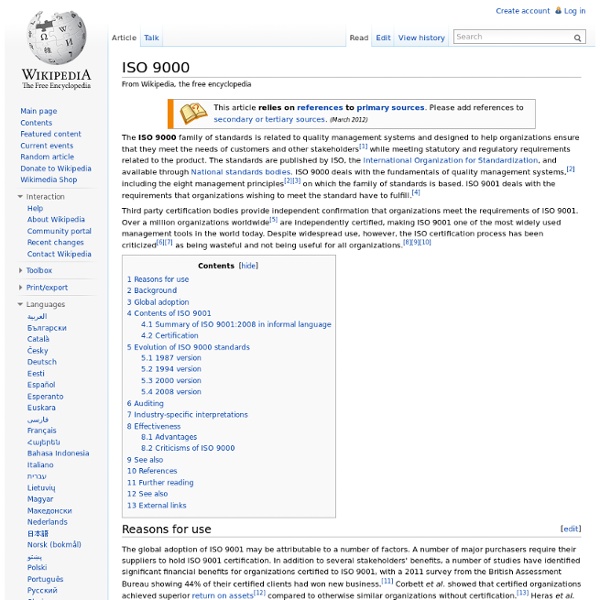ISO 9000
ISO 9000 is a series of standards, developed and published by the International Organization for Standardization (ISO), that define, establish, and maintain an effective quality assurance system for manufacturing and service industries.[1][2] The standards are available through national standards bodies. ISO 9000 deals with the fundamentals of quality management systems,[3] including the eight management principles upon which the family of standards is based.[3][4] ISO 9001 deals with the requirements that organizations wishing to meet the standard must fulfill.[5] Third-party certification bodies provide independent confirmation that organizations meet the requirements of ISO 9001. Over a million organizations worldwide[6] are independently certified, making ISO 9001 one of the most widely used management tools in the world today. Despite widespread use, the ISO certification process has been criticized[7][8] as being wasteful and not being useful for all organizations.[9][10]
ISO - International Organization for Standardization
The International Organization for Standardization (ISO) is an international standard-setting body composed of representatives from various national standards organizations. Founded on 23 February 1947, the organization promotes worldwide proprietary, industrial and commercial standards. It is headquartered in Geneva, Switzerland,[2] and as of 2013 works in 164 countries.[4] It was one of the first organizations granted general consultative status with the United Nations Economic and Social Council. Name and abbreviations[edit] The three official languages of the ISO are English, French, and Russian.[3] The name of the organization in French is Organisation internationale de normalisation, and in Russian, Международная организация по стандартизации. Both the name "ISO" and the logo are registered trademarks, and their use is restricted.[7] History[edit] Plaque marking the building in Prague where the ISO's predecessor, the ISA, was founded. Structure[edit] IEC joint committees[edit] ISO guides
01 - Centre for ISO9000
International Organization for Standardization
An international standard-setting body composed of representatives from national organizations for standards The International Organization for Standardization (ISO; ) is an international standard-setting body composed of representatives from various national standards organizations. Founded on 23 February 1947, the organization promotes worldwide proprietary, industrial and commercial standards. It is headquartered in Geneva, Switzerland,[3] and works in 164 countries.[1] It was one of the first organizations granted general consultative status with the United Nations Economic and Social Council. Overview[edit] The International Organization for Standardization is an independent, non-governmental organization, the members of which are the standards organizations of the 164[1] member countries. Use of the standards aids in the creation of products and services that are safe, reliable and of good quality. Language usage[edit] Name and abbreviations[edit] History[edit] Structure[edit] ISO guides
ISO/IEC 27001
Information security standard ISO/IEC 27001 is an international standard on how to manage information security. The standard was originally published jointly by the International Organization for Standardization (ISO) and the International Electrotechnical Commission (IEC) in 2005[1] and then revised in 2013.[2] It details requirements for establishing, implementing, maintaining and continually improving an information security management system (ISMS) – the aim of which is to help organizations make the information assets they hold more secure.[3] A European update of the standard was published in 2017.[4] Organizations that meet the standard's requirements can choose to be certified by an accredited certification body following successful completion of an audit. The effectiveness of the ISO/IEC 27001 certification process and the overall standard has been addressed in a recent large-scale study.[5] How the standard works[edit] ISO/IEC 27001 requires that management: Certification[edit]
Related:
Related:



